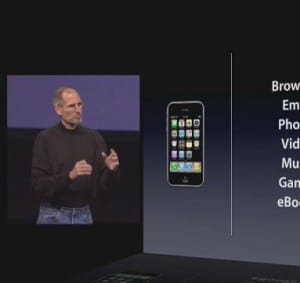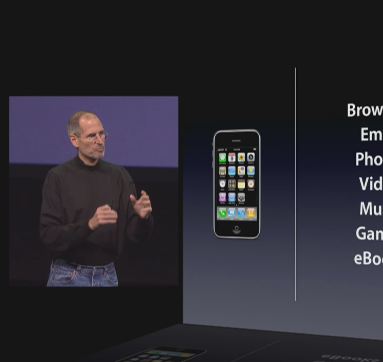
If you watched the Apple iPad launch event last month, you may have noticed something new, at least in comparison to past extravaganzas. Steve Jobs as educator. He’s played many roles to perfection before: egoist, magician, showman, businessman, visionary.
But educator just might be the new role that takes Apple to the next level.
“In order to really create a new category of devices, those devices are going to have to be far better at doing some key tasks,” explains Jobs at the launch, “They’re going to have to be better at doing some really important things. Better than the laptop. Better than the smartphone. ”
What is it he’s trying to teach us, and why?
Apple’s making a play for your pocketbook. And we’re being programmed to want it all.
When you walk into an Apple store you might buy a small mobile device such as the iPhone or iPod Touch. Or you might want something more powerful with a keyboard. You’d walk out with a Macbook of some kind.
But what about iPad? With a 9.7-inch -sized display, it’s a medium (or netbook)-sized mobile device. If Apple can convince you to buy an iPhone, a Macbook, and an iPad then they’ve just successfully expanded their addressable market, potentially by a third if the iPad market develops in similar size to the others—a strong possibility.
So Steve needs to make sure you understand that the iPad can do more than a smartphone or netbook. And that it offers the extreme portability and features such as reading an eBoook not found on other existing mobile devices. It takes extra coursework and lessons. The iPhone and Macbook are much easier sales jobs, we know what they do already, and there’s clearly no overlap between those two.
Thus Steve, the educator, kicks in:
“What kinds of tasks? Well, things like browsing the Web… doing email… enjoying and sharing photographs… watching videos… enjoying your music collection… playing games… reading eBooks…”
He continues, “If there’s going to be a third category of device, it needs to be better a these kinds of tasks, than a laptop or smartphone. Otherwise it has no reason for being.”
If you graduate from Jobs U., and walk out with a new appreciation for marketing and mobile devices categories, then the Cupertino mission is accomplished. You’ve just become about 1/3 more valuable to Apple’s top line.
Before iPad, you could spend about$1,198 on an iPhone and Macbook and pretty much have all that Apple has to offer in mainstream consumer mobile devices.
With iPad, and your new subconscious understanding of iPad product positioning, you could now potentially spend $1,697 without overlap of functionality (for the most part); and that’s just assuming entry level model purchases. It also does not include attach rate sales from accessories, iTunes (movies, music, apps) and carrier service revenue share.
Of that increased amount, $499 comes from the shiny new iPad. That’s about 30% of the revenue mix. You can see why Jobs wants you to understand—to learn—that the Apple iPad is a new category that does things better.
Let’s take this up a notch, to the corporate level. According to ABI Research (and their guess may well be as good as anyone’s), the market for tablets could be approximately 4 million units this year, growing to 57 million by 2015. If Apple captures 50% share of that market (conservative based on their track record with the iPhone, but overly inflated based on their overall PC market share), they would sell 1.5 million units ($749M revenue) this year, and over 28 million ($14B) in just five years. Of course, over time, prices will fall. Still it’s hard not to see what Apple’s thinking here: expand addressable market, grow the company.
And we haven’t even included the multiplier effect iTunes has on Apple hardware sales; micro-transactions add up.
I realize this is simple, table cloth math. But that’s partly the point. It’s what got Apple back on track when Steve Jobs rescued the company in return to CEO. He immediately simplified the company’s then out-of-control product line into a quadrant. It was simple, and everyone—employees, customers, partners—understood it.
While I still have my doubts of the short-term sales success of the iPad, there’s no doubt about Apple’s perfected ability to tell stories, to create new categories, and to get mainstream America to open their wallets… yet again.


